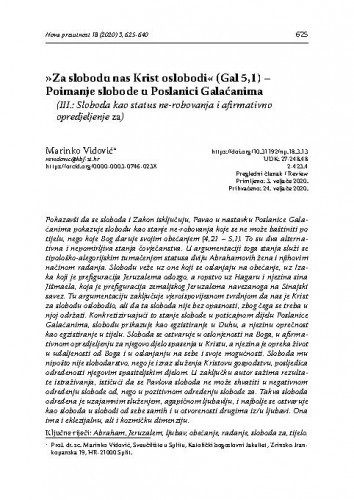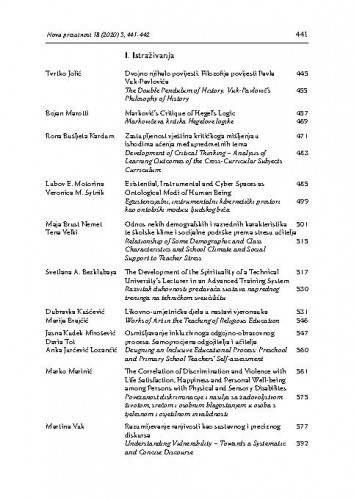Pokazavši da se sloboda i Zakon isključuju, Pavao u nastavku Poslanice Galaćanima pokazuje slobodu kao stanje ne-robovanja koje se ne može baštiniti po tijelu, nego koje Bog daruje svojim obećanjem (4,21 – 5,1). To su dva alternativna i nepomirljiva stanja čovječanstva. U argumentaciji toga stanja služi se tipološko-alegorijskim tumačenjem statusa dviju Abrahamovih žena i njihovim načinom rađanja. Slobodu veže uz one koji se oslanjaju na obećanje, uz Izaka koji je prefiguracija Jeruzalema odozgo, a ropstvo uz Hagaru i njezina sina Jišmaela, koja je prefiguracija zemaljskog Jeruzalema navezanoga na Sinajski savez. Tu argumentaciju zaključuje vjeroispovijesnom tvrdnjom da nas je Krist za slobodu oslobodio, ali da ta sloboda nije bez opasnosti, zbog čega se treba u njoj održati. Konkretiziruajući to stanje slobode u poticajnom dijelu Poslanice Galaćanima, slobodu prikazuje kao egzistiranje u Duhu, a njezinu oprečnost kao egzistiranje u tijelu. Sloboda se ostvaruje u oslonjenosti na Boga, u afirmativnom opredjeljenju za njegovo djelo spasenja u Kristu, a njezina je opreka život u udaljenosti od Boga i u oslanjanju na sebe i svoje mogućnosti. Sloboda mu nipošto nije slobodarstvo, nego je izraz služenja Kristovu gospodstvu, posljedica određenosti njegovim spasiteljskim djelom. U zaključku autor sažima rezultate istraživanja, ističući da se Pavlova sloboda ne može shvatiti u negativnom određenju slobode od, nego u pozitivnom određenju slobode za. Takva sloboda određena je uzajamnim služenjem, agapičnom ljubavlju, i najbolje se ostvaruje kao sloboda u slobodi od sebe samih i u otvorenosti drugima iz/u ljubavi. Ona ima i eklezijalnu, ali i kozmičku dimenziju.; Showing that freedom and the Law are mutually exclusive, Paul continues explaining in the Epistle to the Galatians that freedom is a status-state of nonslavery that cannot be inherited through the flesh, but which God bestows on his promise (4:21-5:1). These are two alternative and irreconcilable states of humanity. Paul’s argumentation of these states is based on a typologicalallegorical interpretation of the status of two Abraham’s wives and the ways their children were born. He binds freedom to those who rely on the promise, to Isaac, who is the prefiguration of Jerusalem from above, and slavery to Hagar and her son Ishmael, who is the prefiguration of earthly Jerusalem bound to the Sinai covenant. He concludes this argument with the confessional claim that Christ freed us for freedom, but that freedom is not without danger, which is why we should hold on to it. In concretizing this state of freedom in the stimulating part of the Epistle to the Galatians, he describes freedom as an existence in the Spirit and its opposition as an existence in the body. Freedom is realized in reliance on God, in an affirmative commitment to his work of salvation in Christ, and its opposition is a life away from God, and in reliance on yourself and your own abilities. Freedom is by no means libertarianism to him, but an expression of service to the lordship of Christ, a consequence of being determined by his saving work. In conclusion, the author summarizes the results of the research, pointing out that Paul’s freedom cannot be understood in the negative determination of freedom from, but in the positive determination of freedom for. Such freedom is determined by mutual service, agape love, and is best exercised as freedom in freedom from ourselves and in openness to others out of / in love. It has both an ecclesiastical and a cosmic dimension.
Sažetak

 Nova prisutnost : časopis za intelektualna i duhovna pitanja : 18, 3(2020) / glavna i odgovorna urednica, editor-in-chief Katica Knezović.
Nova prisutnost : časopis za intelektualna i duhovna pitanja : 18, 3(2020) / glavna i odgovorna urednica, editor-in-chief Katica Knezović.